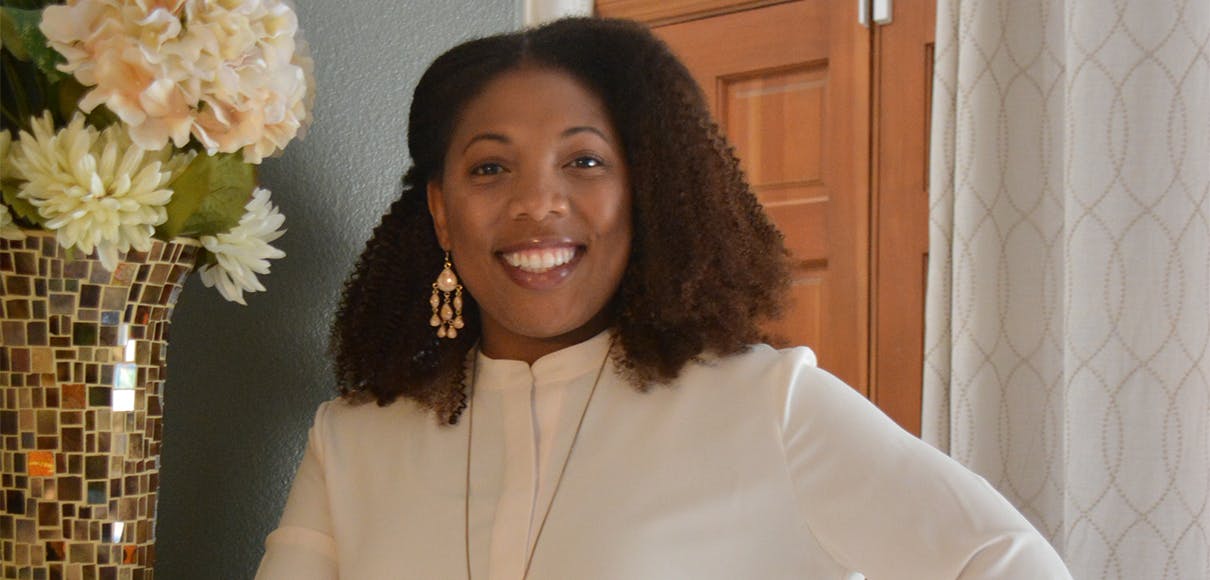Ask Jovonia Taylor-Thibert MBA ’12 about her goals for the future, and she’ll confidently tell you her future is now.
The electrical engineer with an MBA in management is excited about this season of her life. It took her almost two decades of hard work and continuous learning to reach it.
In early March 2020, Taylor-Thibert became a director in the Amazon Robotics Team, focused ergonomic innovations and designs into the company’s technology.
Previously, she spent 17 years in various positions at global aerospace leader Boeing, where she started as a hardware design engineer for airplanes and ultimately worked her way up to chief program engineer for the Boeing 767 airliner.
Taylor-Thibert is the first in her family to venture into the engineering arena. Her father has a background in business; her mother is a pastor; and her three siblings work in business or accounting. While her chosen career path in a STEM field was vastly different, she credits its solid start to strong family support.
“I knew I loved to solve problems. I knew I loved math, and I knew I loved music,” she said. “My parents believed in me to go after my passions and, at the same time, helped instill in me family values and faith values. That was the beginning of my journey.”
Taylor-Thibert initially earned a bachelor’s degree in electrical engineering, as well as in jazz vocals. (Singing in her church ensemble is her happy place, she said. It’s her creative balance, the thing that calms her soul.) She then went on to earn a master of science degree in electrical engineering from the University of Tulsa before she enrolled at Seattle Pacific University to earn her MBA.
One important takeaway from her time at Boeing was the importance of mentors. Today, it’s one key learning that she’s passionate about sharing with undergrads.
“It is hard to ask someone to be a mentor, but for me, I saw individuals I wanted to emulate. I saw their presence in meetings and how they interacted with the team. I saw how humble they were and not boastful of their success,” she said. “I appreciated the characteristics they brought to the table, and that’s what drew me to want to have initial one-on-one conversations.”
When you find someone who’s worthy of being a mentor, she said, it’s important to understand your own goals and communicate them clearly.
“After having a couple of different conversations, I got the courage to ask, ‘Would you consider being a mentor to me?’ and be specific in what I was looking for,” Taylor-Thibert said. “I was looking for career guidance. I wanted to know how to navigate growth on the technical path, and also, what does it take to be a leader in the career space of STEM?”
When she transferred from St. Louis to Seattle through Boeing and subsequently began working on her MBA at SPU, the connections her mentors facilitated eased the transition, she said.
Another key to success is networking, which she considers to be the underlying theme of her personal journey. While her move was a leap of faith, networking helped get her feet firmly on the ground in unfamiliar territory.
“Don’t be afraid to try something different when thinking that you’re alone in the process,” she said. “When you’re talking to your mentors and friends, ask for help, especially in understanding who is in their network and how you can gain allyship.”
She chose SPU because of its holistic approach to leadership. Success isn’t solely based on transactional numbers; it’s also dependent on character. At the time in 2009, she was wavering between getting a master’s degree in either engineering or business administration. SPU allowed her to take a couple of classes for a test run before she decided. That’s when two professors strongly influenced the direction of Taylor-Thibert’s education.
Executive-in-Residence Jim Rand was one of them, particularly in the way he applied broad concepts to real-life scenarios.
“He taught operations management and negotiations. Those were the two classes where I just lit up every time I was in class,” she said. “In his operations management class, I could see where engineering has a small slice in the world of business. My perspective changed as to what I needed to understand as a leader, as in, how do I work with all different spectrums in business and not just my slice of engineering?”
Meanwhile, Ross Stewart, dean of the School of Business, Government, and Economics and professor of accounting, was flexible in his teaching style during a time when Taylor-Thibert was about to give up.
“I kept having challenges. I thought ‘I should be able to do this. They’re numbers. I don’t understand why my spreadsheet isn’t working,’” she said. “He was very patient in helping me understand, ‘Wait, your learning style is a little bit different, so let’s put it in a different context and reframe it.’ The patience he had for me and other students was remarkable.”
Now, Taylor-Thibert is a regular guest speaker in Professor of Biology Cara Wall-Scheffler’s classes at SPU. The goal is to inspire and empower STEM students.
“We talk a lot about what it looks like to be a woman in a STEM field. It really is important that you understand your worth, what tools you’ve gained from SPU, and how to find mentors to help you along your journey,” Taylor-Thibert said. “Then, when students are on the journey to their next milestone, they’ll hopefully pass that knowledge on to somebody else as well.”




